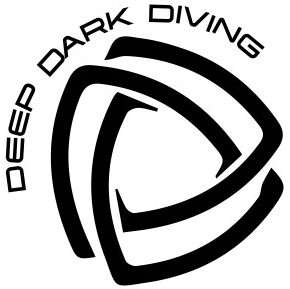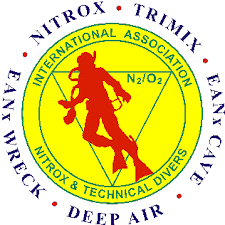Rule N°1 in cave diving: Seek proper training
- What should you consider to choose your cave instructor?
- Things you might want to know about your cave diving instructor
- How frequently does your cave instructor teach courses?
- How often does your cave instructor fail students? And why?
- Does the instructor actually like cave diving?
- Is your cave instructor an active cave diver? or an explorer?
- Does your cave diving instructor dive for fun?
- What courses are they looking at themselves to improve their skills as a diver and as an instructor?
- Do they do the kind of cave diving you are interested in?
- Is your cave diving instructor familiar with the local caves and environment?
- Is your cave diving instructor a good match for you?
- Things you might want to know about your cave diving course
- Which dive training agency should you go for?
- Beyond Certification: Cave Diving Courses Emphasize Training and Skill Enhancement

Cave diving might sound terrifying or adventurous. However, with proper training, cave divers can dive safely and control themselves and the environment. To gain this expertise, the most motivated diver can learn to dive safely in caves through training and practice, with patience and time. Attaining such a cave diving level requires the right mindset and solid instruction from an experienced instructor.
Undertaking a cave diving course can be humbling, challenging, frustrating, and rewarding. And choosing the right cave diving instructor can make all the difference and might even be more important than the training location or the agency.
What should you consider to choose your cave instructor?
To each their own. There are excellent cave and tech diving instructors in many training agencies and with different styles.
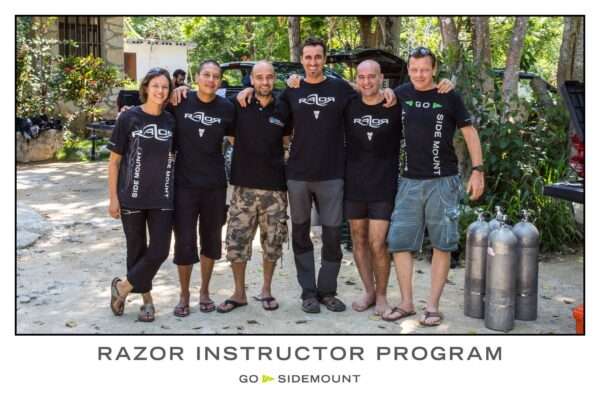
Cave and technical diving differ greatly from recreational diving, as do the instructors teaching these highly advanced scuba diving courses.
Caves are the most demanding environment that recreational divers will dive in. Therefore a proper cave and technical diver training program should be extremely rigorous.
With such a demanding environment, choose the cave instructor who not only requests you meet the minimum standards set by the agency but also pushes you to exceed them and reach your full potential.
Interview the instructors you consider for your training. Prepare a list of questions important for you, and compare the answers from each instructor. This communication will also allow your instructor to know you better, discover your motivations and mindset and decide if you are a good match for each other.
Things you might want to know about your cave diving instructor
Interview your instructor because they should be interviewing you at the same time. If you are not on the same page, it won’t work.
- What experience do they have in teaching cave diving?
- Does your instructor teach other advanced programs?
- In what environments does your instructor have experience?
- How active is your instructor? Full time? Part-time? on the side?
- What is your instructor’s motivation for teaching cave diving?
- Does your instructor keep learning and being a student?
- What configuration is required by the instructor and why?
How experienced is your instructor at the level you intend to train?
Here it would help if you asked how long they have been diving and how long they have been teaching.
Diving is an industry and a business; not all instructors have the same motivations. Some instructors became cave instructors after only a few years of diving. Therefore, they might have great teaching tips and marketing to promote themselves, but they still need real-world experience in cave diving and might lack stories to tell.
Just like divers building up their experience, an instructor should have several years of experience and hundreds of dives at a level before becoming an instructor.
How frequently does your cave instructor teach courses?
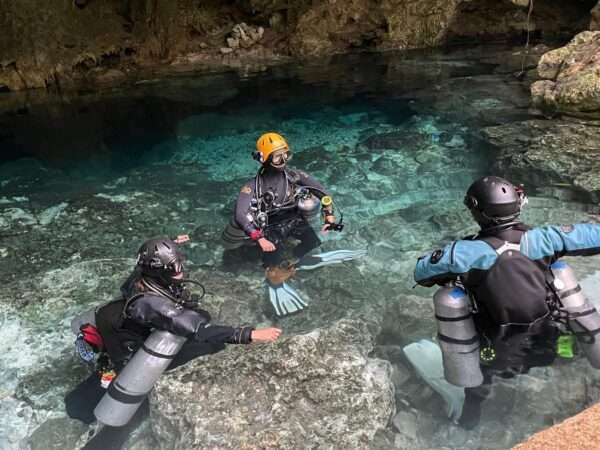
Ideally, you want an instructor actively teaching cave courses. With TDI, all instructors must teach at their highest level regularly; otherwise, that level is lost.
Active cave instructors should have time left for diving, extending their knowledge, learning and perfecting new skills, and exploring new caves.
How often does your cave instructor fail students? And why?
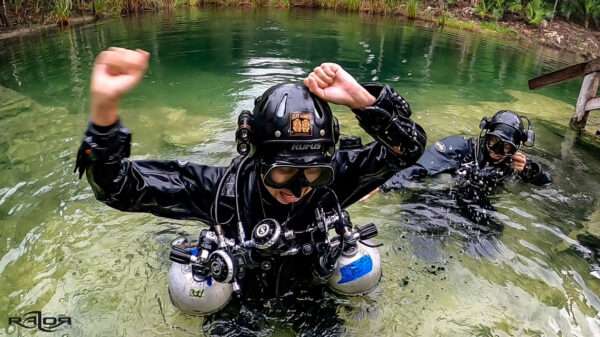
No student wants to fail a course, and no instructor wants to fail a student. But it can happen, and it happens. Cave diving is extremely demanding and requires a lot physically and mentally. Only few divers are built for them.
An instructor with a high failure rate might be doing something wrong, maybe not accepting the right students or not adjusting their teaching techniques for these students. However, a 100% passing rate might mean that the instructor hands out certification cards too easily. And last, cave diving is not for everyone, and maybe some students will find that out during their training.
Failing a course doesn’t mean your instructor should give up on you. No matter what, the cave training will make you a better diver, and your instructor should motivate you to perform the best you can and reach the best level possible, providing you have the right attitude and mindset.
There is no guarantee of passing a cave diving course. Before the course starts, your instructor should clearly explain their expectations and those of the training agency. Solid foundational knowledge is vital to your safety as a cave diver. You will receive the certification card if and only if you attain the required competency. Your instructor mentioning they will fail you if you do not meet these standards is a good sign.
Certification should never be guaranteed; you need to earn it, and with it, you will earn self-confidence and trust in your skills and knowledge. You will be able to cave dive safely and confidently.
Does the instructor actually like cave diving?
Is your cave instructor an active cave diver? or an explorer?
This seems like an odd question. Any instructor is an active diver, and they are diving all the time. But are they really diving? Many instructors only dive when teaching and might have lost their passion. Maybe they are lining out one course after another and have no interest in diving in their free time. So it is always interesting to know their diving experience. Are they involved in any exploration projects? Conservation?
Does your instructor still cave dive for their own pleasure? Do they cave dive or explore? Do they take dive training themselves? Is your instructor enthusiastic about the environment? Teaching Cave diving is exhausting; without passion, your instructor might seem quite burned out.
Does your cave diving instructor dive for fun?
An instructor diving on their day off is usually passionate about the activity and practices their diving skills and procedures to remain competent. There is no endpoint in diving where you suddenly achieve a Zen-like state of total understanding. There is always more to learn. Avoid anyone who only teaches, especially anyone who claims to know everything.
What courses are they looking at themselves to improve their skills as a diver and as an instructor?
Choose an instructor who keeps investing in their personal development as a diver and instructor. They will recognize that you are serious and will be equally motivated. You will be using up-to-date and well-maintained equipment. They will not spare you the difficult parts of training.
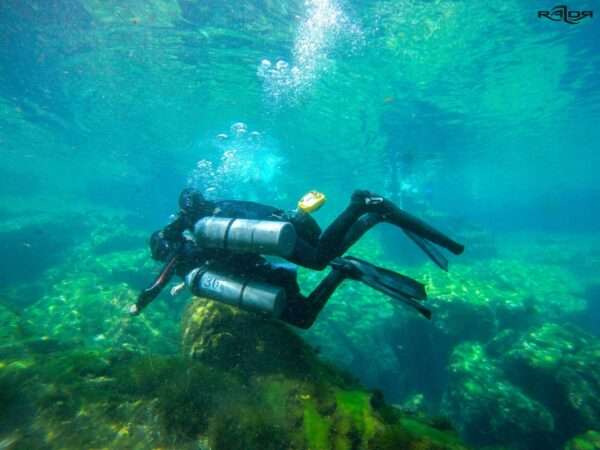
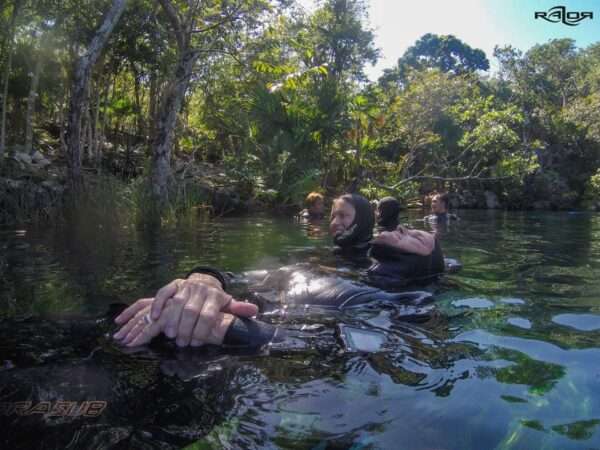
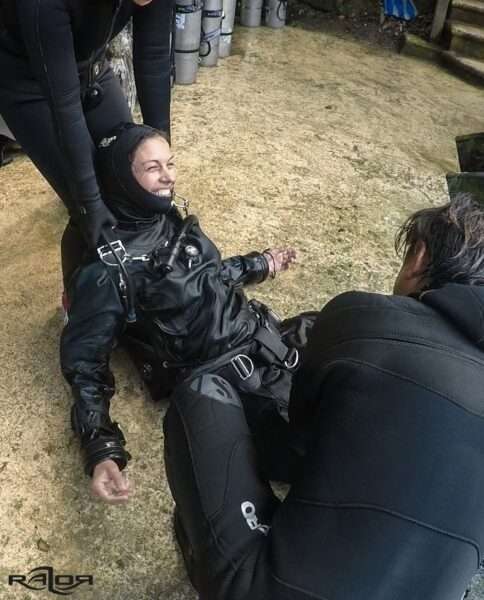
Do they do the kind of cave diving you are interested in?
If you know what kind of diving you want, complete your training with someone who specializes. Many tech instructors cave dive every day, but the caves may be shallow, and the instructor may never go into deco. Everything gets rusty without regular practice.
This also applies to foundation courses. Some instructors may be able to teach a side mount course on paper, but won’t be as thorough as someone who dives side mount every day. The same applies to diving a twinset. Sidemount instructors will inevitably get rusty in a twinset if they don’t dive it.
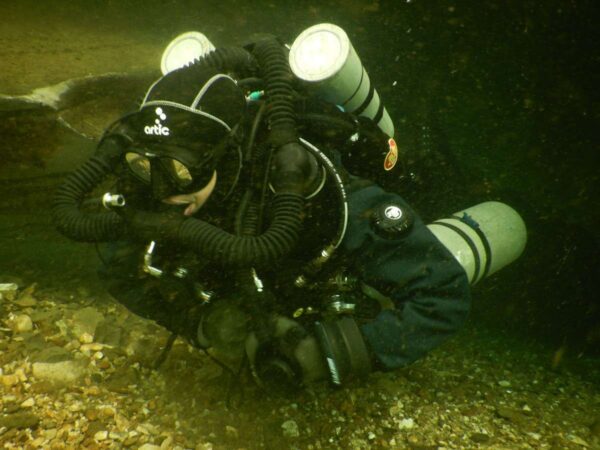
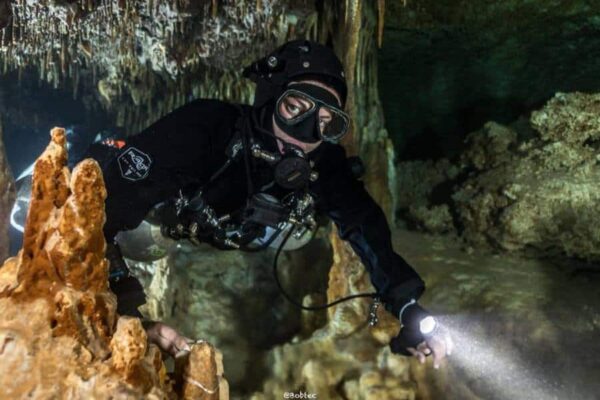
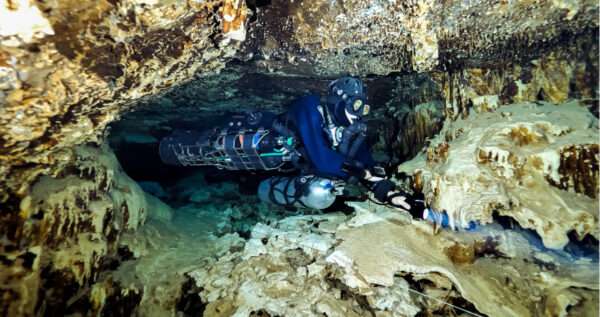
Is your cave diving instructor familiar with the local caves and environment?
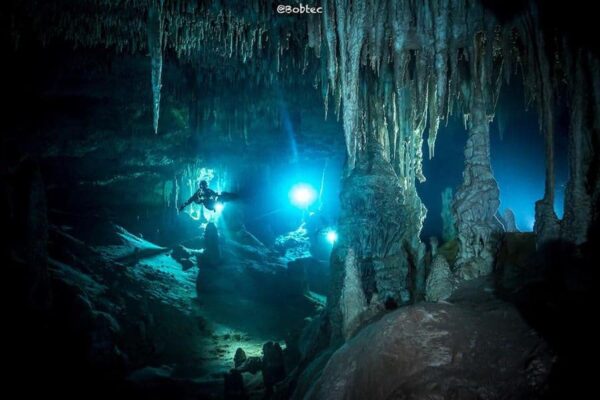
The instructor should be familiar with the area they teach in, with local protocols and safety (speak the local language, have local contacts for support, and be able to contact emergency medical services or a search team).
If you live somewhere isolated, you’ll have little choice but to travel. If you live in a cave-diving mecca like Mexico, you’ll have many cave-diving instructors to choose from. Expenses and the ability to get time off from work are important factors. If you decide to do the course during a vacation, take time for some extra dives afterward and practice what you learned.
There are many advantages in training in the Cenotes of Mexico, find why.
Is your cave diving instructor a good match for you?
Make contact with your instructor and ask a lot of questions. The Only Stupid Question is the One You Don’t Ask
Picking your instructor can be intimidating once you’ve decided to take a cave diving course. Should you travel? Which agency is best? Will you get better training from a well-known instructor? These are just some of the factors that will determine your choice. Here are a few considerations regarding choosing the right technical diving instructor.
How do they teach the course?
Every instructor has a different teaching style. Most instructors can adjust their style based on the needs and personalities of the students.
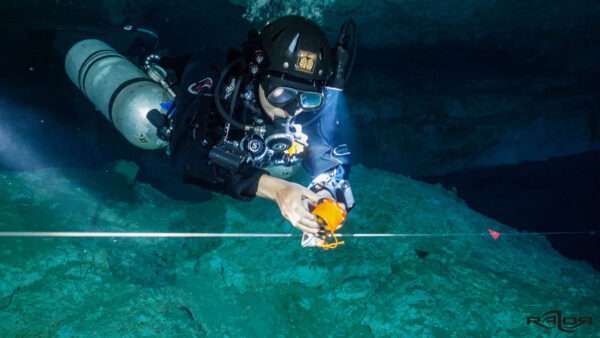
Regardless of teaching style, at some point, all have to get tough and make their point. When you are on your own, planning and conducting your dives with your cave or tech diving buddies, the environment you will be diving in won’t forgive mistakes.
They’ll also emphasize different elements of the course. But some things are crucial to getting the most out of your training.
- Dives should be as long as is practicable to leave time to practice skills like buoyancy or back-kicking.
- Land drills should also be an integral part of the course. The more you’ve practiced something before the dive, the more prepared you’ll be to try it underwater.
- Questions should be encouraged and addressed. Asking what, why, when, where, and how will ensure that you understand and can handle the dives.
Will you get along with your cave diving instructor?
You will spend several long days with your instructor. You might not become best friends, but you do need to get along and exhibit mutual respect. Engage in conversation with your potential instructor before committing to the course by chat, email, or in person.
Is this instructor well-known?
Many cave instructors have become well-known in the industry because they have lots of experience or were pioneers. Others become well-known because they have talent in marketing and self-promoting. For every well-known instructor, many unknowns quietly teach with dedication and passion. Don’t assume you’ll get the best training with a well-known instructor on social media or a lame course with a more anonymous instructor. Many passionate instructors go above and beyond to teach a great course, and that’s what they are good at.
What’s the instructor’s philosophy?
The goal of your cave diving training is to be prepared to cave dive with another certified buddy without a guide. This requires much work from the instructor, the student, and the right approach.
Techniques and gear configurations have evolved with time. The one thing that remains the same is the mindset and the mental attitude indispensable to becoming a safe cave diver.
Be a thinking diver! Don’t just follow a set of rules, don’t be a follower! Become a leader in a team of leaders.
Things you might want to know about your cave diving course
- What is the scope of the cave diver course?
- What is the detailed day-by-day schedule, and what are the goals?
- What are the fees? Ask for a detailed breakdown of fees (manuals, e-learning, c-cards, gas-fills, entrance fees, gear rental, tanks rental, etc.)
- What training sites will you visit?
What makes quality training
There are five things a diving instructor needs for quality training:
- Knowledge
- Experience
- Infrastructure and logistics (equipment, vehicles, dive sites, etc.)
- Ability to communicate and teach
- Motivation to teach



Sammons, P., Kington, A., Lindorff-Vijayendran, A. and Ortega, L. (2014) Inspiring teachers: perspectives and practices. Reading: CfBT Education Trust
All are equally important. If just one of these is missing, you can not have a quality diving course.
The accumulation of knowledge takes time and personal interest. The accumulation of experience is expensive and takes even more time (cave diving outside teaching for an instructor means diving in their free time, traveling to experience new environments, keep training, cave exploration, and multiple dive buddies).
The necessary qualities of an effective teacher include being prepared, having skills in communication, listening, setting clear and attainable expectations, having a positive attitude, showing adaptability, empathy and patience with students, and assessing their teaching regularly. These are rare skills, and it takes hard work, dedication, and time for instructors to master the art of teaching.
Teaching requires motivation and inspiration to share knowledge and experience with someone equally motivated and interested.
Is the price too low? Is it the cheapest?
The bitterness of poor quality remains long after the sweetness of low price is forgotten. ~ Benjamin Franklin
Instructors should be sure to meet or exceed their student’s expectations.

It would be best if you had time to learn and practice with your instructor for a high-quality, thorough course. Something is most likely left out if a course is very cheap or short. Research average course costs in the area.
When a course is cheap, ask yourself where those savings come from. What corners are being cut? Will your dives be short and barely meet standards? Is the equipment properly serviced?
What makes quality cave diving training expensive?
Cave diving is an expensive activity. The equipment needed to perform the dives you will train for is very expensive, and it’s only the beginning. Most instructors love what they do for a living, but they still have bills, rent, taxes, food, equipment maintenance, etc., so a good course comes at a price.
Prices of some well-renowned quality equipment

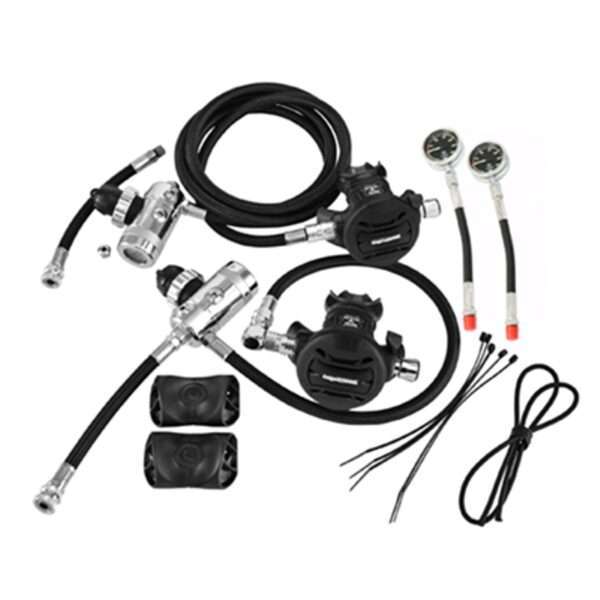
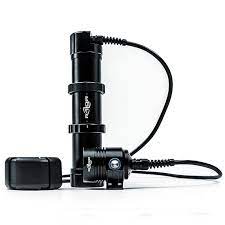
Good instructors value their time, training, and experience, which is reflected in the course price.
Which dive training agency should you go for?
Numerous technical and cave diving agencies teach various courses. To name a few: Technical Diving International TDI, Global Underwater Explorers GUE, International Association of Nitrox and Technical Divers IANTD, and Professional Scuba Association International PSAI. Each with advantages and disadvantages. Choosing between different agencies is a preference based on what you want.
Each agency has pros and cons depending on the course you want to take and the level you want to achieve. Agencies are transparent about what they do and how they do it, so visit their websites and talk to their instructors. You might want to choose the instructor first anyway, and if you like what they say, you’ll probably go with their recommendation.
Beyond Certification: Cave Diving Courses Emphasize Training and Skill Enhancement
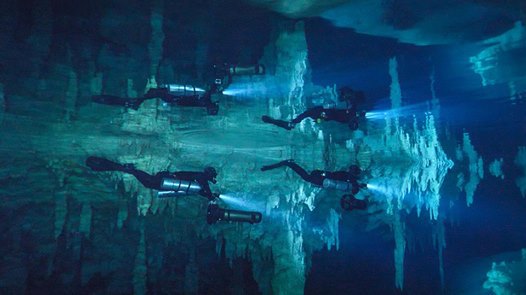
When you take a cave diving course, it is about training and not about certification. You pay for the training if you make it, great! If you don’t make it, you still benefit from the great training, and it will improve your diving. Cave diving is not for everyone, and not everyone can do it.
Understand and acknowledge that more preparation and training can only partially eliminate the risks in scuba diving. Select your instruction wisely.
Find an instructor you feel comfortable with and ask any questions you may have. Each cave instructor has their approach to the same end goal.
The best instructors combine experience in teaching with a passion for excellence in the subject and for sharing their knowledge.
Perfection is not attainable. But if we chase perfection, we can catch excellence. ~ Vince Lombardi
